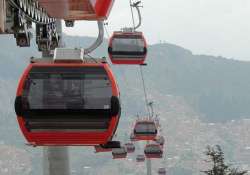World's highest cable-car system opens in Bolivia
La Paz: Bolivian President Evo Morales has inaugurated the world's highest cable-car system, which began carrying passengers between this capital and the adjacent city of El Alto at an elevation of some 4,000 metres above

La Paz: Bolivian President Evo Morales has inaugurated the world's highest cable-car system, which began carrying passengers between this capital and the adjacent city of El Alto at an elevation of some 4,000 metres above sea level.
The transport system gives the roughly 440,000 people who travel each day between these two cities in Bolivia's western highlands a significantly faster alternative.
The $235-million project, executed by the Austrian firm Doppelmayr, consists of 11 stations, 443 10-person cabins and three lines, only one of which is currently in service.
Once the entire network is operating, the cable-car system will run for 10 km and be able to transport up to 3,000 passengers per hour in each direction.
The cabins will depart every 12 seconds, and in the case of the recently inaugurated red line will allow passengers to travel between downtown La Paz and El Alto in 10 minutes.
The country's improved economic situation makes projects of this scale possible, according to Morales, who said the transport system also will provide a boost to tourism.
Local authorities, diplomatic officials and representatives of international organisations attended the inauguration ceremony Friday.
The standard fare is three bolivianos (just under 50 cents), although high-school and university students, disabled persons and the elderly will receive a 50 percent discount, the manager of the Mi Teleferico cable-car system, Cesar Dockweiler, told reporters.
Roughly 1,000 people - mostly Bolivians but also workers from 15 other countries - were involved in the construction phase, which began just over a year ago.
The transport system gives the roughly 440,000 people who travel each day between these two cities in Bolivia's western highlands a significantly faster alternative.
The $235-million project, executed by the Austrian firm Doppelmayr, consists of 11 stations, 443 10-person cabins and three lines, only one of which is currently in service.
Once the entire network is operating, the cable-car system will run for 10 km and be able to transport up to 3,000 passengers per hour in each direction.
The cabins will depart every 12 seconds, and in the case of the recently inaugurated red line will allow passengers to travel between downtown La Paz and El Alto in 10 minutes.
The country's improved economic situation makes projects of this scale possible, according to Morales, who said the transport system also will provide a boost to tourism.
Local authorities, diplomatic officials and representatives of international organisations attended the inauguration ceremony Friday.
The standard fare is three bolivianos (just under 50 cents), although high-school and university students, disabled persons and the elderly will receive a 50 percent discount, the manager of the Mi Teleferico cable-car system, Cesar Dockweiler, told reporters.
Roughly 1,000 people - mostly Bolivians but also workers from 15 other countries - were involved in the construction phase, which began just over a year ago.